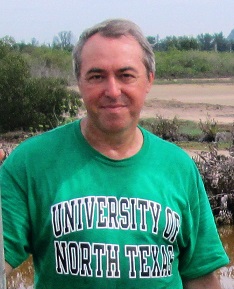Dr.
Harry Williams
Professor
Department of Geography
University of North Texas
1155 Union Circle, #305279
Denton, TX 76203, USA
Fax: (940) 369-7550
E-mail: HarryF.Williams@unt.edu
Harry Williams CV
Faculty Information System
Harry Williams
UNT Geography
UNT
Professor
Department of Geography
University of North Texas
1155 Union Circle, #305279
Denton, TX 76203, USA
Editorial Board Member, Journal of Coastal Research
Fax: (940) 369-7550
E-mail: HarryF.Williams@unt.edu
Harry Williams CV
Faculty Information System
Harry Williams
UNT Geography
UNT
| About me | Research | Courses | Students | Publications |
1. Geology 1610 Physical Geology: physical geology is the study of the rocks that form the crust of the Earth. Topics include: the nature and origin of crustal rocks; surface processes, such as rivers and waves that shape rocks into specific landforms; plate tectonics - a theory that has revolutionized geology in the last few decades and explains the occurrence of mountains, earthquakes and volcanoes.
2. Geography 1710 Earth Science: a broad introduction to the study of the physical characteristics of the surface of the earth. It includes the lithosphere (rocks, soil), atmosphere, hydrosphere (oceans, lakes, rivers, rainfall) and biosphere (plants and animals). The first part of the course deals mainly with weather and climate. The second part concerns geology and landforms of rivers, deserts and coasts.
3. Geology 3020 Historical Geology: the study of the evolution of landforms and life-forms through geologic time. Geologic features such as rock types and fossils are used to interpret and date past events. The first third of the course introduces the basic geologic principles underlying historical geology; the second two thirds of the course focus on the geologic evolution of the North American continent and the evolution of life on Earth.
4. Geography 3050 Introduction to Cartography: an introductory-level course in cartography. Course topics include the theory of map projections; the construction and interpretation of topographic maps that show the shape of the Earth's surface; the use of thematic maps to portray various types of geographically-referenced data; a brief introduction to GIS, surveying and GPS mapping.
5. Geography 4350/5350 Geomorphology: the study of landforms and processes that created them. The course is organized around three major controls on landform development: large scale geologic structures; lithology; erosional and depositional processes. The regional focus is North Texas where landscapes are primarily the result of contrasting rock types and stream erosion and deposition. The final three lectures cover a selection of applied geomorphology topics that explore interactions between people and the physical environment.
6. Foundations of Geographical Thought. More so than most other subjects, geography is a diverse and broad discipline. Part of being an educated geographer is an appreciation of the history and diversity of the subject. This course provides grounding in the history of geography, current research approaches and theoretical frameworks, with a focus on the geography department at UNT. Students will introduce themselves to the class using a short PowerPoint presentation. A series of short videos will be used to chart the historical evolution of geography. Contemporary research approaches will be illustrated by readings of, and discussions with, UNT Geography faculty. The question, “what do geographers do?” will be based on information from AAG Specialty Groups, researched and presented by class members.
